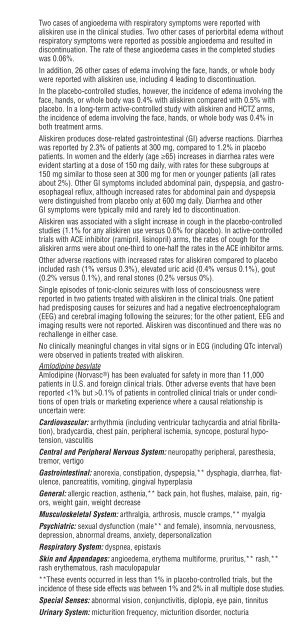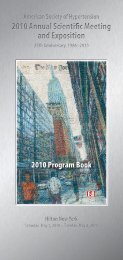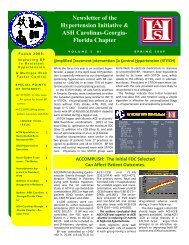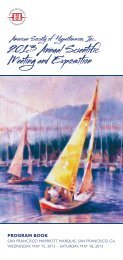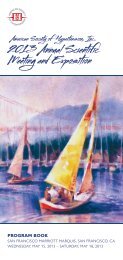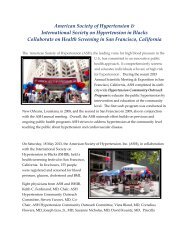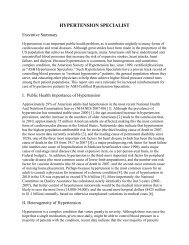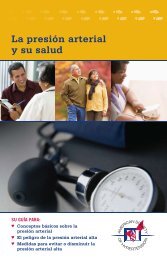2011 ASH Program Book - American Society of Hypertension
2011 ASH Program Book - American Society of Hypertension
2011 ASH Program Book - American Society of Hypertension
You also want an ePaper? Increase the reach of your titles
YUMPU automatically turns print PDFs into web optimized ePapers that Google loves.
Two cases <strong>of</strong> angioedema with respiratory symptoms were reported with<br />
aliskiren use in the clinical studies. Two other cases <strong>of</strong> periorbital edema without<br />
respiratory symptoms were reported as possible angioedema and resulted in<br />
discontinuation. The rate <strong>of</strong> these angioedema cases in the completed studies<br />
was 0.06%.<br />
In addition, 26 other cases <strong>of</strong> edema involving the face, hands, or whole body<br />
were reported with aliskiren use, including 4 leading to discontinuation.<br />
In the placebo-controlled studies, however, the incidence <strong>of</strong> edema involving the<br />
face, hands, or whole body was 0.4% with aliskiren compared with 0.5% with<br />
placebo. In a long-term active-controlled study with aliskiren and HCTZ arms,<br />
the incidence <strong>of</strong> edema involving the face, hands, or whole body was 0.4% in<br />
both treatment arms.<br />
Aliskiren produces dose-related gastrointestinal (GI) adverse reactions. Diarrhea<br />
was reported by 2.3% <strong>of</strong> patients at 300 mg, compared to 1.2% in placebo<br />
patients. In women and the elderly (age ≥65) increases in diarrhea rates were<br />
evident starting at a dose <strong>of</strong> 150 mg daily, with rates for these subgroups at<br />
150 mg similar to those seen at 300 mg for men or younger patients (all rates<br />
about 2%). Other GI symptoms included abdominal pain, dyspepsia, and gastro -<br />
esophageal reflux, although increased rates for abdominal pain and dyspepsia<br />
were distinguished from placebo only at 600 mg daily. Diarrhea and other<br />
GI symptoms were typically mild and rarely led to discontinuation.<br />
Aliskiren was associated with a slight increase in cough in the placebo-controlled<br />
studies (1.1% for any aliskiren use versus 0.6% for placebo). In active-controlled<br />
trials with ACE inhibitor (ramipril, lisinopril) arms, the rates <strong>of</strong> cough for the<br />
aliskiren arms were about one-third to one-half the rates in the ACE inhibitor arms.<br />
Other adverse reactions with increased rates for aliskiren compared to placebo<br />
included rash (1% versus 0.3%), elevated uric acid (0.4% versus 0.1%), gout<br />
(0.2% versus 0.1%), and renal stones (0.2% versus 0%).<br />
Single episodes <strong>of</strong> tonic-clonic seizures with loss <strong>of</strong> consciousness were<br />
reported in two patients treated with aliskiren in the clinical trials. One patient<br />
had predisposing causes for seizures and had a negative electroencephalogram<br />
(EEG) and cerebral imaging following the seizures; for the other patient, EEG and<br />
imaging results were not reported. Aliskiren was discontinued and there was no<br />
rechallenge in either case.<br />
No clinically meaningful changes in vital signs or in ECG (including QTc interval)<br />
were observed in patients treated with aliskiren.<br />
Amlodipine besylate<br />
Amlodipine (Norvasc ® ) has been evaluated for safety in more than 11,000<br />
patients in U.S. and foreign clinical trials. Other adverse events that have been<br />
reported 0.1% <strong>of</strong> patients in controlled clinical trials or under conditions<br />
<strong>of</strong> open trials or marketing experience where a causal relationship is<br />
uncertain were:<br />
Cardiovascular: arrhythmia (including ventricular tachycardia and atrial fibrillation),<br />
brady cardia, chest pain, peripheral ischemia, syncope, postural hypo -<br />
tension, vasculitis<br />
Central and Peripheral Nervous System: neuropathy peripheral, paresthesia,<br />
tremor, vertigo<br />
Gastrointestinal: anorexia, constipation, dyspepsia,** dysphagia, diarrhea, flatulence,<br />
pancreatitis, vomiting, gingival hyperplasia<br />
General: allergic reaction, asthenia,** back pain, hot flushes, malaise, pain, rigors,<br />
weight gain, weight decrease<br />
Musculoskeletal System: arthralgia, arthrosis, muscle cramps,** myalgia<br />
Psychiatric: sexual dysfunction (male** and female), insomnia, nervousness,<br />
depression, abnormal dreams, anxiety, depersonalization<br />
Respiratory System: dyspnea, epistaxis<br />
Skin and Appendages: angioedema, erythema multiforme, pruritus,** rash,**<br />
rash erythem atous, rash maculopapular<br />
**These events occurred in less than 1% in placebo-controlled trials, but the<br />
incidence <strong>of</strong> these side effects was between 1% and 2% in all multiple dose studies.<br />
Special Senses: abnormal vision, conjunctivitis, diplopia, eye pain, tinnitus<br />
Urinary System: micturition frequency, micturition disorder, nocturia


